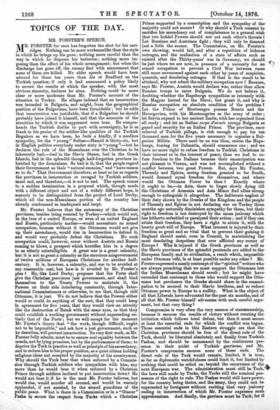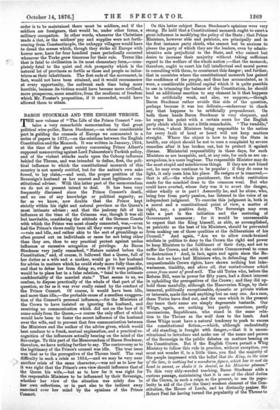TOPICS OF THE DAY.
MR. FORSTER'S SPEECH.
. FORSTER for once has forgotten the shot for his cart-
ridges. Nothing can be more workmanlike than the style in which he brings up his guns ; nothing more careful than the way in which he disposes his batteries ; nothing more im- posing than the effect of his whole arrangement ; but when the discharge has gone off, the enemy find with amazement that none of them are killed. No abler speech would have been uttered for these ten years than his at Bradford on the Turkish question, if only it had announced a policy likely to secure the results at which the speaker, with the most obvious sincerity, declares he aims. Nothing could be more clear or more moderate than Mr. Forster's account of the situation in Turkey. He alleges indeeed that an insurrection was intended in Bulgaria, and might, from the geographical position of the Bulgarians, have been formidable ; but he adds that insurrection was justifiable, that if a Bulgarian he should probably have joined it himself, and that the accounts of the atrocities by which it was suppressed were true. He compre- hends the Turkish dislike to part with sovereignty, he is as frank in his praise of the soldier-like qualities of the Turkish Regulars as we have been, he feels a kindly, if a needless sympathy, for the " young " Sultan—Hamid is thirty-six, but in English politics everybody under sixty is "young "—but he declares the rule of the Mussulman over the Christian to be inherently bad,—bad in the Slavic States, bad in the Greek Islands, bad in the splendid though half-forgotten province in- habited by the Armenians. So bad is it, that the people regard their Government as their "natural enemies," and "have reason so to do." That Government therefore, at least so far as regards the provinces in insurrection or ravaged by Turkish soldiers, must end, and therefore,—it is not to end. The speech comes to a sudden termination in a proposal which, though made with a different object and out of a widely different hope, is scarcely to be distinguished from the project of Lord Derby, which all the non-Mussulman portion of the country has already condemned as inadequate and inept.
Mr. Forster believes that the autonomy of the Christian provinces, besides being resisted by Turkey—which would not, in the face of a united Europe, or even of an united England and Russia, particularly matter—would necessitate an armed occupation, because without it the Ottomans would not give up their ascendancy, would rise in insurrection to defend it, and would very probably defeat the Christians. No such occupation could, however, occur without Austria and Russia coming to blows, a prospect which horrifies him in a degree to us utterly unintelligible. A great war is a great calamity, but it is not so great a calamity as the atrocious misgovernment of twelve millions of European Christians for another half- century. It is, however, a calamity, and one to be avoided at any reasonable cost, but how is it avoided by Mr. Forster's plan ? He, like Lord Derby, proposes that the Porte shall give the Christian provinces just government, and shall bind themselves to the Treaty Powers to maintain it, the Powers on their side interfering constantly, through Inter- national Commissioners or otherwise, to see that, though still Ottoman, it is just. We do not believe that the Powers either would or could do anything of the sort, that they could keep in agreement for five years, that they would view-an atrocity like the destruction of Batak with the same eyes, or that they could establish a working government without superseding en- tirely that of the Porte ; but we will accept for the moment Mr. Forster's theory that "the work, though difficult, ought not to be impossible," and ask how a just government, such as he describes, will prevent insurrection. Its very first work, as Mr. Forster fully admits, must be to ensure real equality between the creeds, not by lying promises, but by the performance of them; to deprive the Turk in practice as well as principle of his ascendancy, and to reduce him to his proper position, as a quiet citizen holding religious ideas not accepted by the majority of his countrymen. Why should the Turk bear that when enforced by a Commis- sion through Turkish soldiers who sympathise with him, any more than he would bear it when enforced by a Christian Prince through soldiers inclined to put insurrection down? He would not bear it if he is the man Mr. Forster believes, but would rise, would murder all around, and would be warmly applauded, if not assisted, by the armed guardians of the public peace. What is there in a Commission or in a "Gia,our" Pasha to secure the respect from Turks which a Christian Prince supported by a conscription and the sympathy of the- majority could not secure ? Or why should a Turk consent to sacrifice his ascendancy out of complaisance to a general wish that two Infidel Powers should not cut each other's throats ? Let Russians and Austrians fight ; they will only be damned just a little the sooner. The Commission, on Mr. Forster's own showing, would fail, and after a repetition of hideous outrages, and the realisation of a state of affairs such as existed after the Thirty-years' war in Germany, we should. be just where we are now, in presence of a necessity for an armed occupation to prevent a Civil War between races still more envenomed against each other by years of suspicion, quarrels, and desolating outrages. If that is the result to be attained, why not admit the military occupation flow? Because, says Mr. Forster, Austria would declare war, rather than allow Russian troops to enter Bulgaria. We do not believe it,. doubting whether the Hapsburgs sympathise so intensely with the Magyar hatred for the Slays; but grant it, and why is Russian occupation an absolute condition of the problem ? Let the Prince of Montenegro possess Bosnia and the Herzegovina, with his Montenegrins as the army of order ; let Servia expand to her ancient limits, with her organised force all ready ; and let an Italian corps d'armee occupy Bulgaria as guard and security for an Italian Prince. The province, once relieved of Turkish pillage, is rich enough to pay for ten thousand men for the five years necessary to organise a Bul- garian Militia. There need be no war then, unless the Haps- burgs, fearing for Dalmatia, should commence one ; and we have no more right to refuse freedom to Turkish Christians in their interest or in the interest of peace, than we had to re- fuse freedom to the Italians because their emancipation was not pleasant to Vienna, and was not accomplished without a conflict between two great Powers. But, says Mr. Forster, Thessaly and Epirus, seeing freedom granted so far South, would demand equal freedom for themselves, and where would the Ottoman Power be then ? Exactly where- it ought to be,—in Asia, there to linger slowly dying till the Christians of Armenia and Asia Minor find allies strong enough to extinguish it altogether. The deliberate neglect of their duty shown by the Greeks of the Kingdom and the people- of Thessaly and Epirus in not declaring war on Turkey three months ago naturally diminishes sympathy for them, but their right to freedom is not destroyed by the mean jealousy which has hitherto enfeebled or paralysed their action ; and if they can. attain their freedom, they have a right to attain it, with the hearty good-will of Europe. What interest is injured by their freedom so great and so vital that to prevent their gaining it England should assist, even in Council, in maintaining the most desolating despotism that ever afflicted any corner of Europe? Who is injured if the Greek provinces as well as the Slavic provinces of the splendid peninsula are added to the European family and to civilisation, a result which, impossible. under Ottoman rule, is at least possible under any other ? Mr. Forster expressed a manly contempt of the " spirited " writers who are always preaching that we must support the Ottomans lest the Indian Mussulmans should revolt ; but he might have extended that contempt to those who would support the Otto- mans lest perchance the Greeks should share in the emanci- pation to be secured to their Slavic brethren, and so reduce Ottoman power in Europe to a nullity. What is the object of all that Liberals have advocated for the past six months, and of all that Mr. Forster himself advocates with such careful argu- ment, but that very thing ?
Compromise is very often the very essence of statesmanship, because it secures the results of victory without creating the- irritation which follows total defeat, but then it must secure- at least the essential ends for which the conflict was begun. Those essential ends in this Eastern struggle are that the- Christian provinces should be free of the direct rule of the Turk, should be liberated absolutely and finally from Turkish Pashas, and should be unmenaced by the continuous pre- sence in their midst •of Turkish garrisons, and Mr. Forster's compromise secures none of these ends. The direct rule of the Turk would remain, limited, it is true, as far as diplomatic watchfulness could limit it, but limited by nothing that could be relied on beyond the occurrence of the ik next European war. The administration must still be Turk,W` the laws still made by Turks, the Turks still the nominal pos- sessors of the right to rule. The Pashas would still have power, for the country being theirs, and the army, they could not be superseded by foreigners without exciting that very jealousy ending in insurrection of which Mr. Forster expresses such apprehensions. And finally, the garrison must be Turk, for if order is to be maintained there must be soldiers, and if the soldiers are foreigners, that would be, under other forms, a military occupation. In other words, whenever the Christians made a riot, or the soldiers' pay and supplies were not forth- coming from Constantinople, the unhappy villagers would have to dread the scenes which, though they strike all Europe with horror now, have for four hundred years periodically occurred whenever the Turks grew timorous for their rule. Terror like that is fatal to civilisation in its most elementary form,—com- pletely fatal to the quiet and rich prosperity which is the natural lot of provinces so fertile as these and people so indus- trious as their inhabitants. The first ends of the movement, in fact, would not have been attained, and it would recommence at every opportunity, the outbreak each time being more horrible, because its victims would have become more civilised, more prosperous, more sensitive, from the modicum of freedom which Mr. Forster's proposition, if it succeeded, would have allowed them to attain.



































 Previous page
Previous page